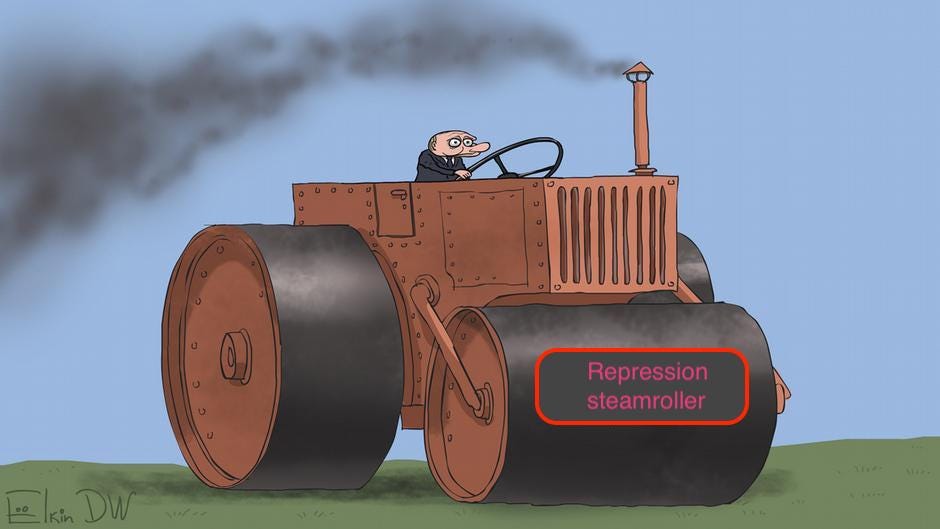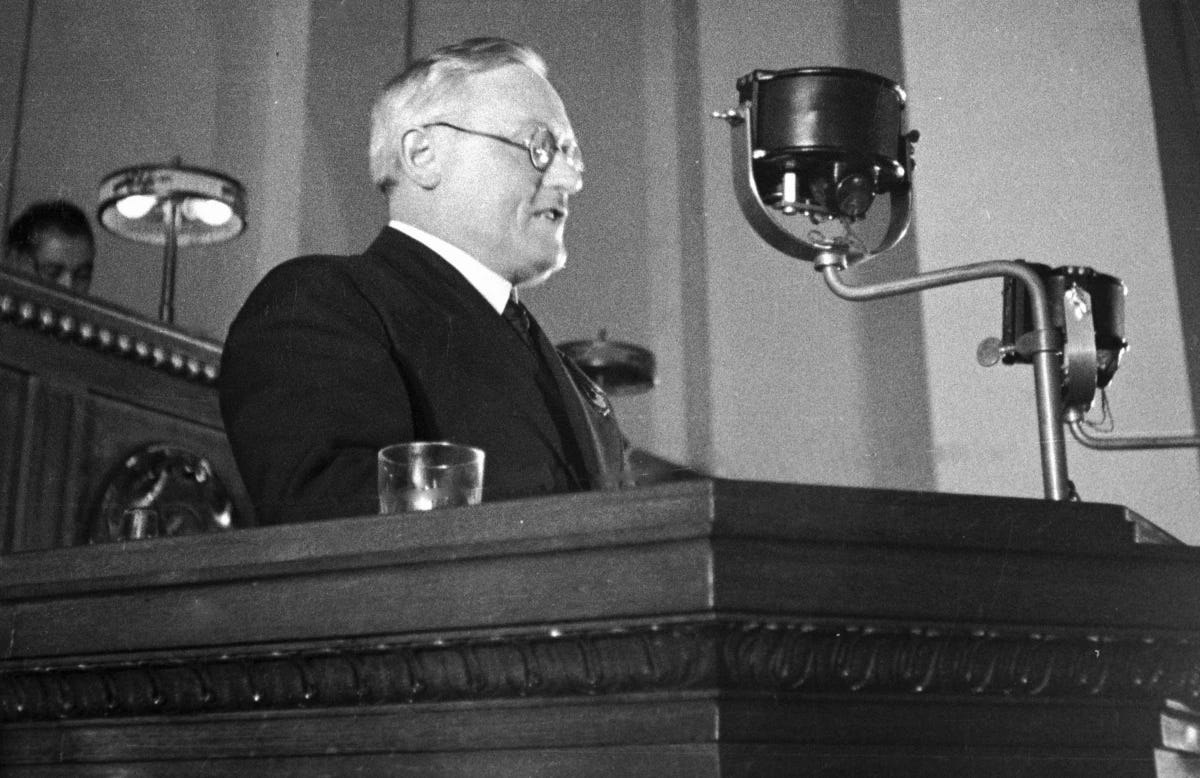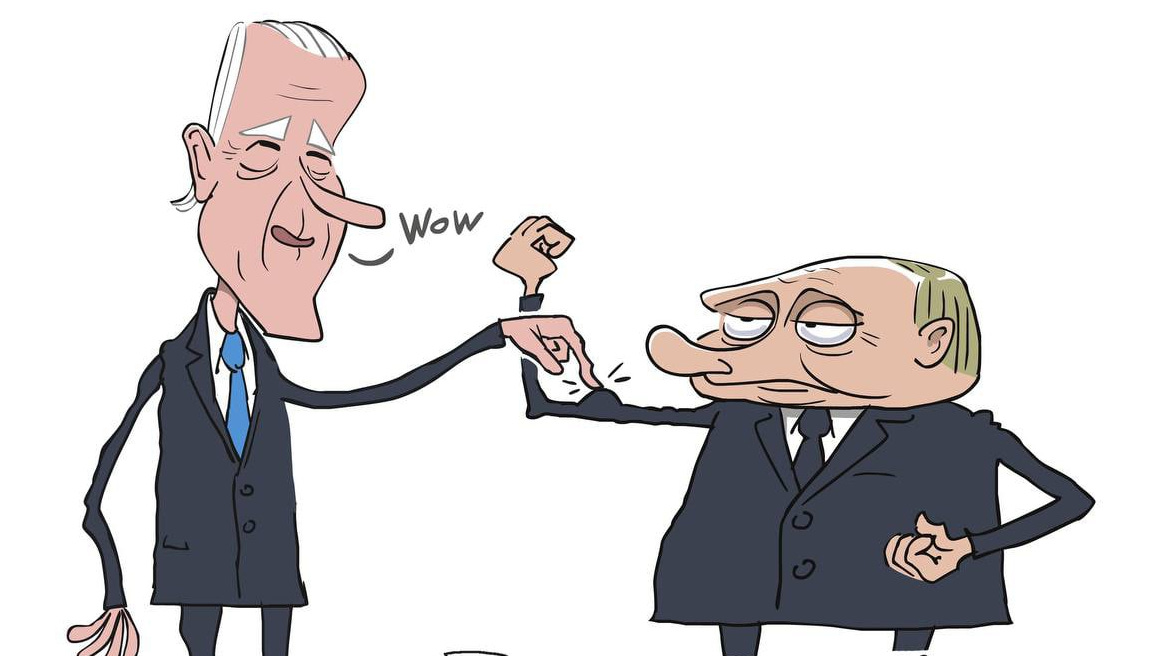Alexey Navalny - Man of the Year in Russia. The other side of the Soviet coin.For my friends—the law
December 30, 2021
2021 outcome: Politics. Carnage
It is perhaps symbolic that 2021 began with the arrest and imprisonment of Alexei Navalny—he had returned to Russia when he recovered after being poisoned by Russian secret police (FSB) with a chemical warfare agent, “Novichok,”—and ended with a mass political slaughter on New Year’s Eve:
A Karelian court increased the sentence from 13 to 15 years in prison for Yuri Dmitriev, a historian known for bringing up the memory of political repression victims in Karelia in the 1930s and 1940s. He discovered the mass graves of people shot in Sandarmoh and Krasnoe Bor. This was the fourth trial on the same charge. The first took place in 2016, when Dmitriev was acquitted.
On December 28, the Russian Supreme Court ordered the liquidation of the International Historical, Educational, Charitable, and Human Rights Society “Memorial” (International Memorial) for violating legislation on foreign agents. International Memorial was founded in 1987, with the participation of Andrei Sakharov, to research political repression in the Soviet Union and contemporary Russia and promote the moral and legal rehabilitation of those subjected to political repression.
Here’s how prosecutor Alexei Zhafyarov voiced the charge:
“Memorial International was created as a memorialization organization, but now... Instead of remembering its glorious achievements, Memorial makes us repent for the Soviet past.
“Memorial has focused almost entirely on distorting historical memory—first and foremost, about the Great Patriotic War.
“By speculating on the political repression of the 20th century, Memorial creates a false image of the USSR as a terrorist state and whitewashes and rehabilitates Nazi criminals and renegades, who had the blood of Soviet citizens on their hands. Why are we now, descendants of the victors, forced to watch attempts to rehabilitate traitors to the Motherland and Nazi collaborators?”!
On December 29, the Moscow City Court liquidated the human rights center Memorial [the sister of International Memorial] on the same grounds, violating the law on foreign agents. This time the accusation was as follows: “[Memorial] conducts its financial activities non-transparently and does not fully report its income and expenditures... the organization concealed receipt of foreign funding, failing to comply with the law on marking its materials, and also in its materials experts found signs of approval of extremism and terrorism... Memorial demonstrates persistent disregard for the Russian Constitution and laws, violates the rights of citizens and the right to access information.”
On December 28, in four Russian cities (Tomsk, Irkutsk, Arkhangelsk, and Engels), former directors of regional branches of Alexei Navalny’s organization were detained and searched. The courts ordered restrictions to be imposed on them. Among them is Ksenia Fadeeva, a member of the Tomsk City Duma.
• On December 29, Violetta Grudinina, the former head of the Murmansk branch of Alexei Navalny’s organization, was put on the federal wanted list.
Here’s how the charge in the “Trotskyist-Zinoviev Terrorist Center Case,” pronounced in 1936 by Prosecutor General Andrei Vyshinsky, sounded: “...this trial revealed to the end and once again proved how great and immense the malice and hatred of our enemies for the great cause of socialism is; this trial showed how <...> a despicable, insignificant bunch of adventurers tried to trample with their dirty feet the best fragrant flowers in our socialist garden.”
His successors have lost their rhetorical skills, but they have not lost their anti-dissent skills.
Alexey Navalny - Man of the Year in Russia
Twenty-six percent of Russians named Vladimir Putin “Man of the Year” in a Levada-Center poll. Alexei Navalny and Sergei Shoigu (5% each) came in second place, and Sergei Lavrov, Mikhail Mishustin, and Alexander Lukashenko all placed third (4% each). The pollster had to name one person (from Russia or another country) himself.
The results of the poll confirmed that Navalny is the only public politician who competes with Vladimir Putin. It should not be forgotten that Navalny has been in detention since January 17 and cannot engage in public activities, except for Instagram posts, in which he talks about his life in the prison camp.
Urgent request
Vladimir Putin requested an urgent conversation with President Biden, which the latter accepted because he "believes when it comes to Russia there is no substitute for direct leader-leader dialogue." The conversation between the two leaders will take place on the morning of December 30.
Two weeks ago, the Russian President publicly declared his demands on the West to provide Russia with security guarantees. After that, the Western leaders have consolidated their positions and announced that they have elaborated an agreed position for negotiations with Russia. Russian-American talks will take place on January 10, and Russia-NATO talks on January 12.
I think that Putin's urgent request for a conversation is connected with some kind of surprise that the Russian leader has prepared for his American counterpart. This surprise may concern either arms control, or the situation around Ukraine, or (much less likely) negotiations with Iran. Most likely, Putin is ready to make some kind of proposal before the start of negotiations and wants the American administration to prepare its response before the meeting.
Steelmakers, get ready
Maksim Shaskolsky, the head of Russia’s Federal Antimonopoly Service (FAS), said his office conducts investigations into possible antimonopoly violations by Russia’s largest metallurgical companies (Severstal, NLMK, and MMK). These cases were initiated in the spring of 2021 following complaints from Gazprom, Rosneft, shipbuilding company Zvezda (under Rosneft’s management), and others, which accused the steelmakers of establishing and maintaining monopolistically high prices for hot-rolled steel. According to the FAS, prices for rolled steel rose by more than 50% in the first half of 2021. At the same time, prices for raw materials did not grow as fast, and demand did not increase that much, the regulator believes. The companies argue that the increase in prices in the domestic market was due to the global situation.
“This is a violation of the antitrust laws—although market conditions were not conducive to this price increase. And we believe that there are violations here, so since the companies are the largest, we work. We have 100 volumes of documents there for each company; we are studying this situation.”
Although the official said the investigation results will be announced next year, he hinted that the verdict would be guilty and the steelmakers could receive substantial negotiable fines. “Maybe the fines against the steelworkers will be bigger than those against Google, so you don’t forget about those markets either... maybe we’ll surprise you here as well,” the FAS head said.
For my friends—the law
“For my friends everything, for my enemies the law .” This maxim is often used by dictators in various countries to justify their actions against political opponents. In 2011, Vladimir Putin, then Prime Minister of Russia, said he liked this principle. “One very prominent person said this: ‘For my friends everything, for my enemies the law.’ I would like to see such a thesis, such an informal slogan in our country.” It is said and done. This principle of attitude toward the Russian opposition has become a norm of life.
However, it turns out that sometimes the law must be applied to “his friends .” For example, when they need to be relieved of responsibility.
A court in Moscow ended the criminal investigation of former Federal Security Service (FSB) officer Andrei Vasilyev due to the expiration of the limitation period. According to the investigation, in 2011, Vasilyev and two of his FSB colleagues forced two Russian businessmen to transfer shares in their company that owned apartments in new buildings in Moscow.
The court found that the crime took place and was ended on December 11, 2011, and, therefore, the 10-year limitation period for prosecution had expired. In this regard, the court granted the defense’s motion and, on December 27, released Vasilyev from prosecution on non-excusable grounds and relieved him from house arrest. The court also granted the request of lawyers and returned Vasilyev’s arrested property—several dozen plots of land, a dozen houses and apartments in Moscow and Moscow region, bank accounts with about $10 million, a Lexus LX-450 car, and a set of wristwatches by Breguet, Tourbillon, Hublot, and Rolex brands.
A practical question
Last week, Vladimir Putin did not answer a question about the possibility of recognizing the Taliban as the legitimate government of Afghanistan. I wonder if he already knew that the issue was a practical one.
The Taliban plans to appoint their ambassador to Moscow. Zabiullah Mujahid, the movement’s spokesman, has announced: “We have a plan, especially for existing embassies; we plan to appoint an ambassador to Moscow, and we will do it. This is a diplomatic step. Embassies and consulates are important for diplomatic relations, and we are cooperating in that.”
Oil and gas strategy
Alexander Novak, Deputy Prime Minister of the Russian government in charge of the energy complex, gave an extensive interview to the RBC news agency in which he:
Clearly articulated the Kremlin’s position on gas supplies to Europe—no spot sales, only long-term contracts. “We are accused of not supplying additional volumes of gas to Europe. Sign long-term contracts; we will be ready to supply more. This offer is always valid.”
Reported that Russia intends to support the OPEC+ agreement and is ready for new agreements to limit production, if necessary. “We have a charter signed by the 24 countries that are parties to the OPEC+ agreement for an indefinite period of cooperation. It will definitely continue [after 2022] in the format of consultations, exchange of information, analytical data, etc. The need for joint action to adjust production is only due to the situation on the market. We do not know what it will be like in a year.”
Predicted that oil production in Russia will remain at current levels for the next 10 years. “Until 2030, we forecast Russia’s production to remain at 550 million-560 million tons (10.75-11.00 mbd).”
Announced that the Russian government intends to increase pressure on oil companies to limit gasoline price increases. “This [ 2021] year, the indicative price (the notional wholesale price from which compensation is calculated for oil companies for not raising retail prices to the level of the export price) was reduced by 1,800 rubles and it was planned to be restored to that amount from January 1, 2022. This could have affected retail prices, so it was decided to abandon this promise. Next year, the indicative price in the damper formula will be indexed at 3%, well below inflation that reached 8.4% by year-end. As a result, the indicative price level from which the dampening compensation will be paid will be lower.” At the end of 2021, the federal budget will pay about 650 billion rubles ($8.8 billion) to oil companies as compensation for lost profits for keeping domestic retail gasoline prices within limits set by the government.
The other side of the Soviet coin
Three days ago I talked about Vladimir Putin and his ministers’ desire to revive “the good Soviet times.” But life has reminded us that, apart from the good things that lovers of the “glorious past” like to talk about, Soviet economic practices were characterized by a total shortage that the officials could not defeat.
The Russian government’s decision to restrict the export of fertilizer was well-intentioned—to provide farmers with fertilizer for the spring sowing campaign while export prices and propensity to export skyrocket. However, the restrictions immediately hit other sectors. Coal companies warned the government that they were short of ammonium nitrate for blasting.






